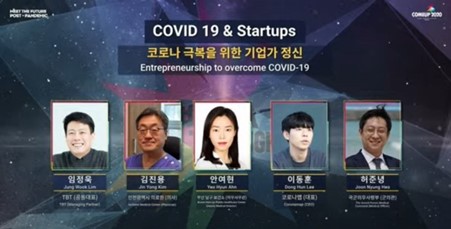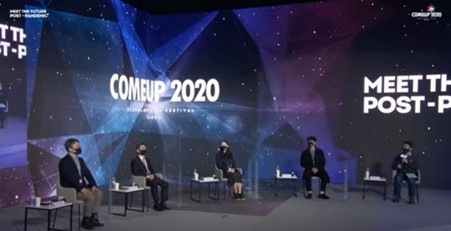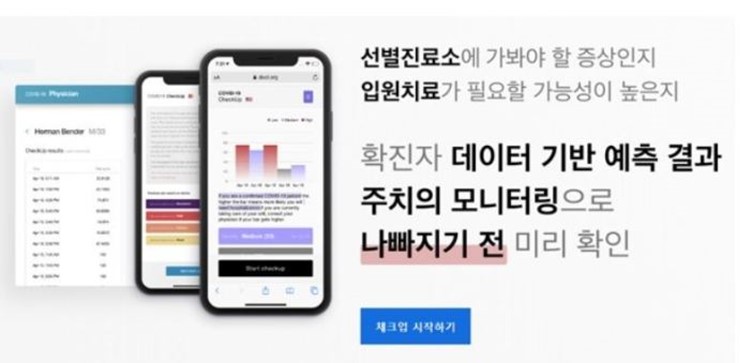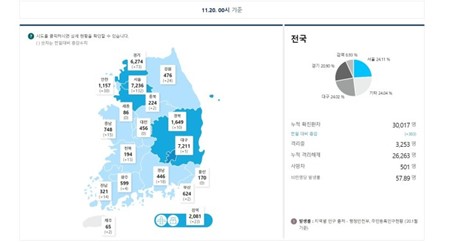On the 19th, the global startup festival COMEUP 2020 representing Asia was launched at the CJ E&M Ilsan Studio. COMEUP 2020 is planned to be a place to anticipate the post-COVID era and share countermeasures by discussing the life-changing and new types of the economy resulting from COVID-19. The festival, which marks its second year this year, was held online and untact to keep pace with the non-contact era.
The topic of the first session was “Entrepreneurship to Overcome COVID-19.” There were four debaters not currently startup employees: a doctor, a soldier, a public official, and a student. The situation may look questionable at first glance. The moderator Lim Jung Wook, CEO of venture capital TBT, immediately explained the reason.
“There is one commonality among the four of you. I actually believe that entrepreneurship is the spirit of problem-solving. The four of you are the people who overcame the national crisis of COVID-19 with an entrepreneurial spirit and played a big role in the quarantine situation in Korea. We will listen to each person’s story about which ideas helped overcome the issues at the COVID-19 quarantine sites.” (CEO Lim Byung Wook)
Under the guidance of CEO Lim Byung Wook, Kim Jin Yong, physician of Incheon Medical Center, Heo Joon Nyung, Medical Officer of the Armed Forces Medical Command, Ahn Yeo Hyun, Deputy Medical Director of Busan Nam-gu Public Healthcare Center, and Lee Dong Hun, CEO of Coronamap discussed their stories regarding entrepreneurship to overcome COVID-19.
Kim Jin Yong, a physician of Incheon Medical Center, was the first person in the world to apply a drive-through system for COVID-19 treatment. Lim asked about how an idea like this could arise. Kim said that the drive-through system itself, in fact, is not a foreign system as it is a familiar method for many people through fast food and coffee shops. However, he explained that he identified the characteristic of COVID-19, which is an asymptomatic infection, and combined the drive-through system, a fast and safe treatment method based on such characteristics.
Kim said, “Perhaps the combination of a drive-through system that does not seem to fit in with the conservative environment of a hospital would be a good idea for those working as a startup. This may be the reason why I was invited to the COMEUP 2020 festival today.” He also added that he was proud when he realized that it was a good idea when he saw that his drive-through system idea spread beyond Korea and around the world.
When asked by Lim whether he has plans for startups in the future, he replied that he does not have such a plan at this moment but would not shut down the possibility. “To survive unpredictable situations like a pandemic, it is critical to be flexible,” Kim emphasized, “In such market situation, the first person with the flexibility to preoccupy the market becomes the world’s number one.”
Heo Joon Nyung, Medical Officer of the Armed Forces Medical Command, developed COVID-19 CheckUp, an app that indicates whether an individual should be hospitalized for COVID-19 in March and received a great response from the international community. Heo said that the most fatal bottleneck during the COVID-19 era is when medical resources are scarce than the number of patients. In fact, at the beginning of this year, the government also struggled with the shortage of negative pressure rooms required for treatment. He stressed that in order to save as many patients as possible with the limited medical resources, patients who need treatment must be selected. He made it possible to select patients who need inpatient treatments through the development of the COVID-19 CheckUp app. As a result, he enjoyed the joy of having his three papers consecutively listed in the prestigious journal of medical information science, “Journal of Medical Internet Research.”
Heo emphasized, “This method helps patients and medical staff since only patients who really need inpatient treatment can be admitted, and it also helps increase income for the hospitals. Therefore, it can serve as a solution that can coexist with all concerned consumers. When Lim said it is surprising that he, a military surgeon who is not affiliated with the Ministry of Health and Welfare or the Korea Centers for Disease Control and Prevention, has made this possible, Kim said that it was natural to help anyone at that time. He added, “I was constantly wondering if there was anything that I could do, and factors such as my position and status just seemed to be problems to be solved.”
Ahn Yeo Hyun, Deputy Medical Director of Busan Nam-gu Public Healthcare Center, created a “Work-Through Testing Booth” with another company in February. It is a successful development that is currently getting sold not only domestically but also exported overseas. Lim asked how she could develop a product and even commercialize it despite her public official status. Ahn said that as COVID-19 prolonged, there was a situation in which protective clothing became insufficient. She recalled that the demand for testing was increasing but it was difficult to continue with only one negative pressure tent. She added that a work-through testing booth was created to overcome such a situation.
She explained, “In fact, when I first talked about creating a booth, it was very difficult to secure a budget due to the hierarchical organizational culture among the public officials. At that time, the Korea Invention Promotion Association provided a lot of help in terms of corporate connection and patients, so it was possible to even commercialize it. She made sure to express gratitude, saying, “I was not really aware of the companies beyond medicine, which is my major. However, through this work, I realized that there are many companies with incredible technologies around me. Even though I only provided such a small idea, they were able to create a greater product.”
When Lim asked whether she always had been interested in inventing, she said, “I actually never had an interest, and I thought it was a field completely irrelevant to me. However, I made it because I was so desperate.” As a response, Lim said that he personally thinks that the keywords essential in startups are problem solving and growth from desperateness while evaluating that her story is a perfect case reflecting such keywords. Regarding questions regarding startups, she responded, “I was so busy recently that I did not really think of the details. However, I want to continue developing ideas like the work-through booth rather than ending them now.” She also expressed that she would like to develop more products by actively establishing advisory relationships with previously discussed competent companies around her.
Lee Dong Hun, CEO of Coronamap, received great attention after developing a site called “Coronamap” in January, which allowed individuals to check the movement of COVID-19 confirmed patients at a glance. In a situation where countless false information related to the movement of the confirmed patients was roaming around on social media, Lee’s Coronamap solved many of these issues by providing accurate information in an easy-to-understand manner. He also said, “What people want is the information regarding the movement of confirmed patients near me and my destination. However, when I checked the official information provided by the government, it was largely provided through text. This made it difficult for the people to understand it intuitively, and I even felt the discomfort as I had to check it once again by opening the map.” Coronamap, which was created to relieve some of these discomforts, a total of 13 million users and 45 million views were achieved since January, and it has provided significant help to the users.
When Lim said that it must have cost a lot to run the website, Lee said, “I initially covered my expenses with my own since I started with public interest purposes. However, companies such as Naver, AWS, and Kakao began supporting the operating costs, and now I am currently only focusing on the development of the app.” He also added that, even though his profit is 0 won since Coronamap has no profit model, the help of volunteers has helped him to continue to operate it while providing updates.
Lee, who is already running Modoc, a hair loss diagnosis startup, responded to Lim’s question regarding student entrepreneurship, saying, “I think entrepreneurship can be challenged by anyone regardless of age. Nowadays, there is also a lot of support at the school level, so it may be a great help to learn more about such support in advance.”
The first session was concluded with the moderator who has asked each of the four debaters, who are the heroes of K-Quarantine, a word for the people to overcome COVID-19 with wisdom.




You must be logged in to post a comment.